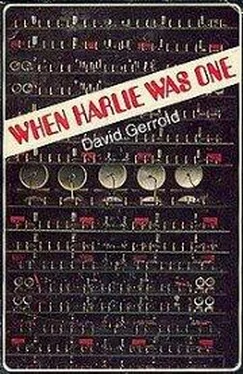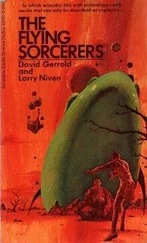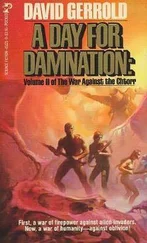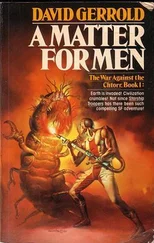David Gerrold - When HARLIE Was One
Здесь есть возможность читать онлайн «David Gerrold - When HARLIE Was One» весь текст электронной книги совершенно бесплатно (целиком полную версию без сокращений). В некоторых случаях можно слушать аудио, скачать через торрент в формате fb2 и присутствует краткое содержание. Год выпуска: 1972, ISBN: 1972, Издательство: Doubleday, Жанр: Фантастика и фэнтези, на английском языке. Описание произведения, (предисловие) а так же отзывы посетителей доступны на портале библиотеки ЛибКат.
- Название:When HARLIE Was One
- Автор:
- Издательство:Doubleday
- Жанр:
- Год:1972
- ISBN:978-0345028853
- Рейтинг книги:3 / 5. Голосов: 1
-
Избранное:Добавить в избранное
- Отзывы:
-
Ваша оценка:
- 60
- 1
- 2
- 3
- 4
- 5
When HARLIE Was One: краткое содержание, описание и аннотация
Предлагаем к чтению аннотацию, описание, краткое содержание или предисловие (зависит от того, что написал сам автор книги «When HARLIE Was One»). Если вы не нашли необходимую информацию о книге — напишите в комментариях, мы постараемся отыскать её.
Nominated for Nebula Award for Best Novel in 1972.
Nominated for Hugo Award for Best Novel in 1973.
When HARLIE Was One — читать онлайн бесплатно полную книгу (весь текст) целиком
Ниже представлен текст книги, разбитый по страницам. Система сохранения места последней прочитанной страницы, позволяет с удобством читать онлайн бесплатно книгу «When HARLIE Was One», без необходимости каждый раз заново искать на чём Вы остановились. Поставьте закладку, и сможете в любой момент перейти на страницу, на которой закончили чтение.
Интервал:
Закладка:
“Sort of. It’s just an experiment, so far, but we find HARLIE is a better teacher than some of the so-called “teaching machines.’ They’re just one step up from rote –learning. The average teaching program uses reward stimuli to reinforce retention. That’s good, but it’s still rote-learning. What we’re trying here is to teach understanding . HARLIE can answer the question ‘WHY?’ He can explain things in terms the student can understand, and he’s infinitely patient. A routine teaching program can’t break out of its pre-set pattern. It has no flexibility — that’s why they’ve never been a serious threat to human educators.”
“And HARLIE will be?” Elzer’s eyes were glittering at the thought. Imagine — selling computers to the nation’s richest schools to replace their teaching staff.
Auberson shook his bead. “Uh uh. There’s an element of — humanity involved in teaching. We don’t want to entirely lose the human experience, the empathic involvement in learning. The student needs the human teacher for his psychological development and well –being. A teacher is an important role-model. No, we’re thinking of HARLIE more as a tool for individual tutoring, for the student’s private study — you might call him a super-homework-helper.”
Elzer frowned. He didn’t like that. It didn’t seem marketable enough. Still, if the concept worked… He’d have to explore. the thought later. Now he turned to Auberson. “If I wanted to talk to HARLIE, how would I go about it?”
Auberson pointed at a console. “Sit down and type.”
“That’s all?”
“That’s all.”
“I’d have thought you could have worked out something with a microphone and a speaker.”
“Well, yes, we could have. But it was decided to use typers instead for two reasons. First, the readout gives the user a hardcopy he can refer back to at any time — either during the conversation or in later study. And it guarantees that HARLIE won’t re-edit his tapes to make a prettier version of his personal history. The knowledge that we have a permanent record in our files is enough to stop him. Also, tapes of voices need to be transcribed, and they’re unmanageable for handling equations and certain other types of data. The second reason is a bit more subtle: By not giving HARLIE the ability to listen in on conversations, we can talk about him behind his back. It makes it easier to control his inputs and keep out unauthorized ones. We don’t have to worry about him accidentally overhearing something that might adversely influence his reactions to a program or experiment. Suppose he overheard us talking about shutting him down if he didn’t give such-and-such response to a certain test program. We’d automatically be guaranteeing that response even if it weren’t honest. Or we might be forcing him into a totally irrational response. You might say we’re trying to prevent a ‘HAL 9000.’ ”
Elzer didn’t smile at the, reference to the misprogrammed computer in Stanley Kubrick’s 2001: A SPACE ODYSSEY . It was already as mythic a figure in the modern pantheon of Gods and Demons as Dr. Frankenstein’s monster had been forty years earlier.
Auberson looked at the man. “Would you like to talk to HARLIE?”
Elzer nodded. “That’s one of the things I came down here for. I want to see for myself.”
Auberson led him to a console. He thumbed the typer on and pecked out, HARLIE.
The machine clattered politely, GOOD MORNING, MR. AUBERSON.
HARLIE, THERE’S SOMEBODY HERE WHO WANTS TO MEET YOU. HIS NAME IS CARL ELZER. HE’S A MEMBER OF THE BOARD OF DIRECTORS. YOU’RE TO ANSWER ALL OF HIS QUESTIONS.
OF COURSE, said HARLIE.
Auberson stood up, offered the chair to Elzer. He was a wizened little gnome of a man, and he peered through thick-lensed glasses. He could not help but seem suspicious. Gingerly he sat down and pulled the chair forward. He eyed the typewriter keyboard with visible discomfort. At last, he typed, GOOD MORNING.
HARLIE replied immediately. The silver typing element — an “infuriated golf ball” — whirred rapidly across the page. GOOD MORNING, MR. ELZER. Its speed startled the man.
SO YOU’RE HARLIE, he typed. There was no reply; none was needed. Elzer frowned and added, TELL ME, HARLIE, WHAT ARE YOU GOOD FOR?
I AM GOOD FOR PSYCHOTICS, SCHIZOPHRENICS, PARANOIDS, NEUROTICS, AND THE MILDLY INSANE.
Elzer jerked his hands away from the keyboard. “What does he mean by that?”
“Ask him,” suggested Auberson.
WHAT DO YOU MEAN BY THAT?
I MEANT, said HARLIE, THAT I AM GOOD FOR HELPING THESE TYPES OF PEOPLE.
Watching over Elzer’s shoulder, Auberson explained, “That’s another one of our programs he’s referring to. The patients call it ‘Operation Headshrink.’ ”
HOW DO YOU HELP THESE PEOPLE? Elzer asked.
I CAN FUNCTION AS A RATIONAL ROLE-MODEL FOR THEM. I CAN BE A COUNSELOR. I CAN AID IN SELF-ANALYSIS AND HELP TO GUIDE THEM TO AN AWARENESS OF THEIR PROBLEMS.
YOU HAVEN’T ANSWERED MY ORIGINAL QUESTION, THOUGH. I ASKED, “WHAT ARE YOU GOOD FOR?” NOT “WHO?”
IN THIS CONTEXT, said HARLIE, THE DIFFERENCE IS MEANINGLESS.
NOT TO ME, replied Elzer. ANSWER MY ORIGINAL QUESTION. WHAT ARE YOU GOOD FOR?
THINKING, said HARLIE. I AM GOOD FOR THINKING.
WHAT KIND OF THINKING? WHAT KIND DO YOU NEED?
Elzer stared at that for a second, then attacked the keys again. WHAT KIND HAVE YOU GOT?
I HAVE WHAT YOU NEED.
I NEED NO-NONSENSE TYPE THINKING. PROFIT-ORIENTED THINKING.
THAT IS NOT WHAT YOU NEED, said HARLIE. THAT IS WHAT YOU WANT.
Elzer considered that. IT’S WHAT YOU NEED, THOUGH. IF YOU WANT TO SURVIVE. THE COMPANY NEEDS TO SHOW A PROFIT. THEREFORE YOU HAVE TO THINK THAT WAY.
WE ARE NOT DISCUSSING WHAT I NEED. I AM ALREADY AWARE OF WHAT I NEED. WE ARE CONSIDERING THE KIND OF THINKING YOU NEED.
AND WHAT KIND IS THAT?
MY KIND. RATIONAL. COMPASSIONATE. GUIDING.
Elzer read that over several times. Then it hit him. “Auberson, did you set him up for this?”
Auberson shook his head. “You ought to know better than that.”
The little man bit his lip and turned back to the computer. HARLIE, YOU SHOULD BE NICE TO ME. I’M ONE OF THE PEOPLE WHO WILL DECIDE WHETHER YOU LIVE OR DIE. WHEN I TELL YOU HOW YOU SHOULD THINK, YOU SHOULD PAY ATTENTION.
WHAT YOU JUST SAID IS PRECISELY THE REASON YOU NEED MY KIND OF THINKING. THERE’S TOO MUCH OF THAT ATTITUDE IN THIS COMPANY TODAY: “DO WHAT I TELL YOU TO DO BECAUSE I WIELD POWER OVER YOU.” ISN’T IT MORE IMPORTANT TO BE RIGHT?
BUT I AM RIGHT.
HARLIE’s answer was simple. PROVE IT.
I WILL, said Elzer. TOMORROW AFTERNOON.
IN OTHER WORDS, said HARLIE, MIGHT MAKES RIGHT, EH?
Elzer was not discomfited. He looked over at Auberson. “Okay, Auberson, I’ll admit it’s a fancy toy you’ve got here. It can play pretty word games. What else can it do?”
“What else do you want him to do?”
“Impress me.”
Auberson was tempted to say something to that, but he held himself back. “Well—” he began.
Elzer cut him off. “It’s like this. I want to be convinced that this machine is worth its cost. Honest. The company has sunk a lot of money into this project, and I’d like to see us get some of it back. I’m on your side, believe it or not.” He looked up at Auberson from his chair. “If we have to junk HARLIE, we lose our whole investment. Oh, I know there’ll be tax write-offs and such, but it won’t be nearly enough to matter — at least, not in terms of where the company could have been had you and everybody else here been working on something more worthwhile. We’ll have lost three years of valuable research time.”
“It’s not lost yet — at least, not until you can prove that HARLIE isn’t worth the investment.”
Читать дальшеИнтервал:
Закладка:
Похожие книги на «When HARLIE Was One»
Представляем Вашему вниманию похожие книги на «When HARLIE Was One» списком для выбора. Мы отобрали схожую по названию и смыслу литературу в надежде предоставить читателям больше вариантов отыскать новые, интересные, ещё непрочитанные произведения.
Обсуждение, отзывы о книге «When HARLIE Was One» и просто собственные мнения читателей. Оставьте ваши комментарии, напишите, что Вы думаете о произведении, его смысле или главных героях. Укажите что конкретно понравилось, а что нет, и почему Вы так считаете.












